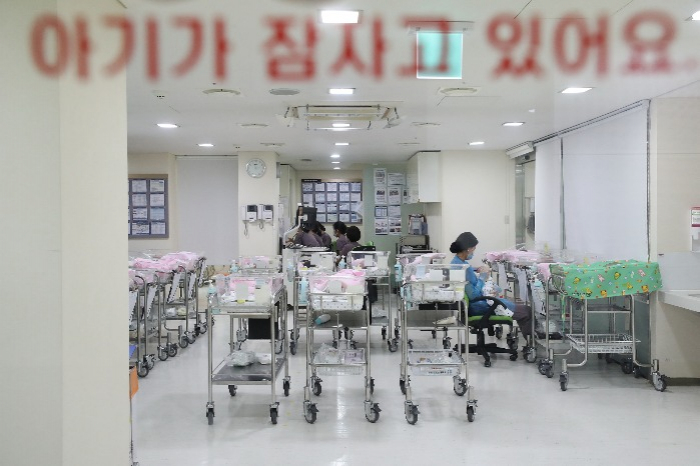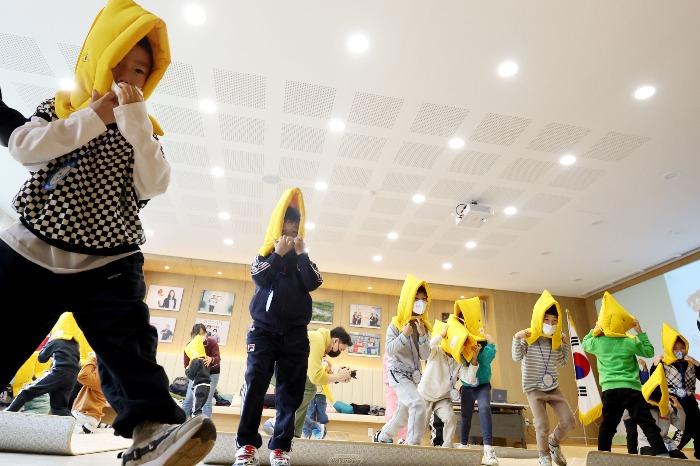Culture & Trends
High- and low-income S.Koreans alike reluctant to have babies: Survey
Affluent Koreans choose freedom late in life over care of children, while modest earners blame economics
By Apr 18, 2023 (Gmt+09:00)
3
Min read
Most Read
LG Chem to sell water filter business to Glenwood PE for $692 million


Kyobo Life poised to buy Japan’s SBI Group-owned savings bank


KT&G eyes overseas M&A after rejecting activist fund's offer


StockX in merger talks with Naver’s online reseller Kream


Mirae Asset to be named Korea Post’s core real estate fund operator



South Koreans in low- and high-income brackets alike are unwilling to have children due to either insufficient time or money, found a recent survey of people aged 25 to 45 in Asia’s fourth-largest economy grappling with the world’s lowest fertility rate.
But worse yet, the outlook for the country’s childbirth is so grim that more than half of the respondents foresee “no recovery” in Korea’s fertility rate.
According to a joint survey of 800 Koreans on their perception of marriage and childbirth by The Korea Economic Daily and global market research and consulting firm Ipsos, conducted between March 30 and April 12, 48.8% of the respondents answered that they have no plan to have babies.
The survey’s margin of error is plus/minus 3.5 percentage points at the 95% confidence level.
Those in the high-income bracket earning 10 million won ($7,578.63) or more per month who chose not to have babies stood at 61.0%, while those in the low-income bracket making less than 2 million won with no plan to have children amounted to 59%.
Both were 10 percentage points higher than the average response by other-income earners.
The biggest reason to avoid childbirth for high-income earners was freedom from the childcaring burden with a 60.0% response, followed by a financially and mentally rewarding life in their old age at 52.0%. Those who cited financial reasons were 36.0%.
On the contrary, 75.0% of the low-income respondents cited financial hardship as a main reason to avoid childbirth.
Albeit different reasons, the latest survey result underscores how challenging it is for Korea to boost its population even after spending more than $200 billion over 16 years toward that goal.

DASHED HOPES FOR A RECOVERY IN FERTILITY RATE
“Greedy work” is the major culprit that interrupts high-income earners’ childbirth and childcaring, said Choi Seulki, a professor of sociology specializing in demography at KDI School of Public Policy and Management.
Greedy work is a job that pays more in exchange for long, inflexible hours, cited as a main cause of inequality between genders or incomes.
“High-income earners often struggle to balance work and family because they frequently work after working hours. It is hard for them to be responsible for childcare,” said Choi.
South Korea’s fertility rate, the average number of children a woman bears in her lifetime, hit its historic low of 0.78 in 2022, down 0.03 from the previous record low rate in 2021.
This was again the lowest among the Organization for Economic Co-operation and Development’s (OECD) 38 member countries last year. The OECD average fertility rate was 1.59, with France, Australia and Italy recording 1.79, 1.58 and 1.24, respectively.
The survey respondents presented a gloomy outlook on the country’s childbirth, with 50.5% forecasting it will be hard for the country’s fertility rate to pick up, of which 17.8% answered "impossible" to a recovery.
Of those with better hope, 28.0% projected the rate would bounce back in the next 10 years.
More than 90% of the respondents agreed that Korea’s low birth rate is a serious problem.
Still, many people remain reluctant to have children and Korea seems to have reached an impasse after failing to find a magic wand to boost the country’s childbirth rate.
Write to Jin-gyu Kang at josep@hankyung.com
Sookyung Seo edited this article.
More to Read
-

-
 Culture & TrendsS.Korea's elderly population to exceed 10 million in 2024
Culture & TrendsS.Korea's elderly population to exceed 10 million in 2024Feb 28, 2023 (Gmt+09:00)
1 Min read -
 EconomyS.Korea hits historic low fertility rate in 2022, adding to economic woes
EconomyS.Korea hits historic low fertility rate in 2022, adding to economic woesFeb 22, 2023 (Gmt+09:00)
2 Min read -
 EconomyS.Korea forecast to have world's oldest population by 2070
EconomyS.Korea forecast to have world's oldest population by 2070Sep 06, 2022 (Gmt+09:00)
2 Min read
Comment 0
LOG IN


